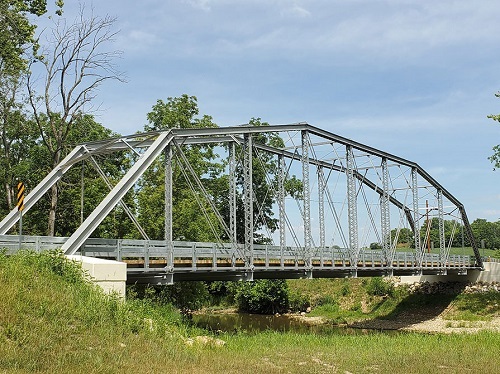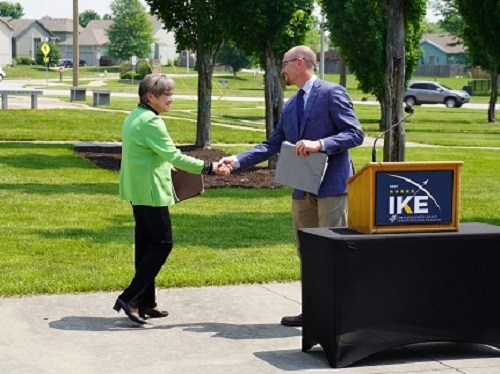Governor Laura Kelly (D) and Calvin Reed, acting secretary of the Kansas Department of Transportation, recently announced more than $11 million will be awarded to 14 local transportation construction projects statewide through the agency’s “Cost Share Program” for spring 2023.
[Above photo by the Kansas DOT]
The Kansas DOT Cost Share Program – established in 2019 as part of the 10-year Eisenhower Legacy Transportation Program or IKE – is designed to help rural and urban areas alike advance local transportation projects to improve safety, support job retention and growth, relieve congestion, and improve access and mobility.
To date, Kansas DOT said its Cost Share Program has resulted in the investment of more than $125 million in state funding in almost 150 projects statewide, with nearly an additional $100 million in matching local funds.
“With these projects, my administration is making investments that address short term challenges to bring long-term solutions to communities,” the governor noted in a statement. “The Cost Share program has been a success because of the partnerships we’ve built with local governments to make financial commitments alongside us.”
[Editor’s note: The American Association of State Highway and Transportation Officials recently hosted a knowledge session at its 2023 Spring Meeting in Seattle that delved into ways transportation agencies can get the most out of the discretionary grant programs funded by the $1.2 trillion Infrastructure Investment and Jobs Act or IIJA enacted in November 2021 – especially in terms of helping fund local infrastructure projects.]
Gov. Kelly unveiled this latest disbursement of Cost Share Program funds at a press event in the City of Gardner, which is getting state fiscal support for its South Center Trail. This particular round of Cost Share Program funding is supporting safer and improved access to schools, health care, recreational amenities, and housing.
“We rely on local leaders to bring us their best ideas for projects that, with a little help, can make a significant difference in a community,” noted Kansas DOT’s Reed. “Communities come to the table with a solid project plan, the support of local business and community members, and matching funds in place. State dollars help get the projects to the finish line.”
State departments of transportation across the country provide funding to local transportation projects via a variety of programs – many aimed at boosting active transportation opportunities.
For example, the New Jersey Department of Transportation, in partnership with the South Jersey Transportation Planning Organization or SJTPO, recently awarded $5.2 million to six local infrastructure projects under the Transportation Alternatives Set-Aside or “TA Set-Aside” program.
“As part of our ‘Commitment to Communities,’ we work with the three metropolitan planning organizations to provide federal funding to counties and municipalities for local transportation projects that improve safety and strengthen the cultural, aesthetic, and environmental aspects of our transportation system,” noted New Jersey DOT Commissioner Diane Gutierrez-Scaccetti. “[Those] grants will fund projects to improve safety for pedestrians and cyclists in six South Jersey communities without having to impact local property taxes.”
Meanwhile, in April, the Illinois Department of Transportation recently awarded $127.9 million through the Illinois Transportation Enhancement Program or ITEP to support 72 local mobility projects statewide.
“The Illinois Transportation Enhancement Program is … designed to support alternate modes of transportation, to preserve visual and cultural resources, and improve quality of life,” explained Governor Jay “J.B.” Pritzker (D).
Those 72 local mobility projects selected include biking and walking paths, trails, streetscape beautification and other projects designed to encourage safe travel across the various modes of transportation at the local level.
“The ITEP gives our local partners the resources they need to improve quality of life for their communities and strengthen the state’s overall transportation system,” added Illinois DOT Secretary Omer Osman. “We’re putting dollars to work in the communities that need them most, investing in infrastructure and increasing travel options to make Illinois a safer and more enjoyable place to work, build a business and raise a family.”


